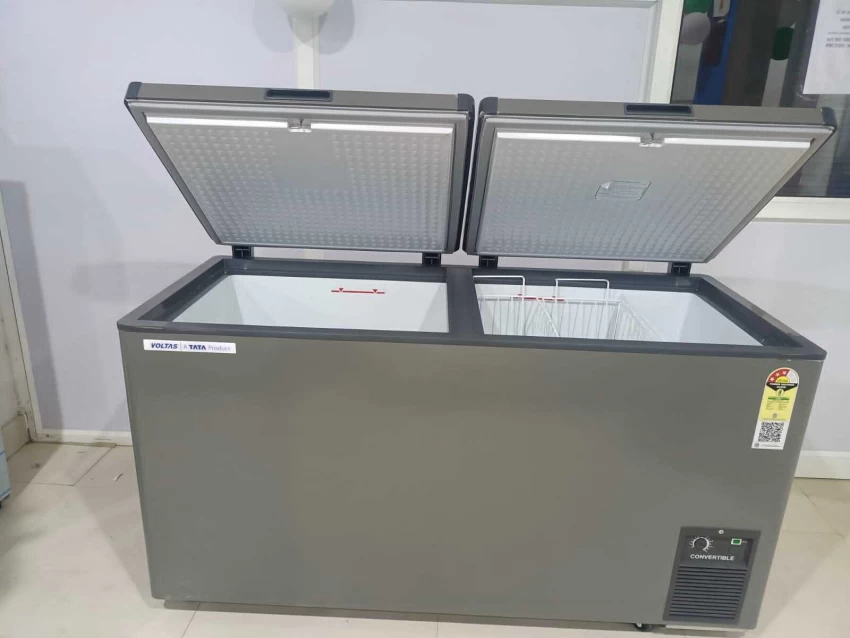Your freezer is one of the hardest-working appliances in your home, quietly running day and night to preserve your food. But when something goes wrong, it can quickly turn into a major headache. From ice buildup that blocks airflow to a freezer that simply isn’t cooling, these problems not only waste energy but also put your food supply at risk. At Salt Life Appliance Repair, we’ve assisted many homeowners in diagnosing and fixing freezer problems. In this guide, we’ll cover the most frequent issues and their underlying causes, and when it’s time to call a professional.
Common Freezer Problems and What They Mean
Ice Buildup Inside the Freezer
A thin layer of frost is normal, but when you notice thick sheets of ice on the walls, shelves, or around the door, it’s a sign of trouble. A buildup of too much ice often points to a damaged door seal, excess humidity getting inside, or a malfunction in the defrost system. Ignoring this issue can restrict airflow and reduce cooling efficiency.
Freezer Not Cooling Properly
If your freezer feels more like a refrigerator, there are several possible culprits. Cooling issues can stem from clogged vents, dusty condenser coils, low refrigerant levels, or a malfunctioning compressor. In some cases, the problem might be as simple as overloading the freezer with items that block cold air circulation.
Strange Noises or Clicking Sounds
Modern freezers are fairly quiet. If you hear loud buzzing, rattling, or repetitive clicking, it could mean the evaporator fan motor or compressor is failing. These parts often require professional diagnosis and repair.
Water Leaks Around the Freezer
Puddles of water on the floor can point to a clogged defrost drain. When ice melts, the resulting water is meant to travel through a small drain tube into a pan located beneath the appliance. When the tube is blocked, the water has nowhere to go but onto your kitchen floor.
Freezer Running Constantly
If your freezer never seems to shut off, it may be working overtime to maintain its temperature. Dirty coils, a broken thermostat, or warm air entering through a worn door gasket are common causes. Running constantly not only wears out components faster but also increases your energy bill.
DIY Troubleshooting Tips
Before calling for professional freezer repair, there are a few basic steps you can take:
- Check the Power Source: Make sure the freezer is plugged in securely and the outlet is working.
- Inspect the Door Seal: A damaged or loose gasket lets warm air in, leading to frost and poor cooling. Replace if necessary.
- Clean the Coils: Dusty condenser coils force the freezer to work harder. A vacuum or coil brush can quickly solve this.
- Avoid Overpacking: Leave room for air to circulate inside the freezer. Blocking vents can mimic a cooling failure.
- Reset the Thermostat: Ensure the temperature is set between 0°F and 5°F for optimal performance.
If these steps don’t resolve the problem, it’s time to call a professional technician.
Why Choose Professional Freezer Repair
Attempting complex freezer repairs without experience can do more harm than good. Components like compressors, refrigerants, and electronic control boards require specialized tools and knowledge. At Salt Life Appliance Repair, we diagnose issues accurately and fix them safely, saving you time and money.
Professional service also means extending the life of your appliance. Instead of replacing your freezer prematurely, timely repairs can keep it running efficiently for years. Plus, our technicians use manufacturer-approved parts to ensure reliability.
Preventing Freezer Problems
The best way to avoid costly repairs is regular maintenance. These habits can help ensure your freezer operates efficiently:
- Defrost when needed: If you have a manual-defrost freezer, don’t let frost layers build thicker than a quarter inch.
- Check seals regularly: Clean gaskets and make sure doors close tightly.
- Keep it clean: Vacuum behind and underneath the unit every few months.
- Don’t overload it: Even frost-free freezers need airflow. Overpacking makes the compressor work harder.
- Keep an eye on the temperature: By using a freezer thermometer to maintain steady cooling.
When It’s Time to Replace Instead of Repair
While many freezer problems can be fixed, there comes a point when replacement is more cost-effective. If your freezer is more than 15 years old, uses outdated refrigerants, or requires frequent costly repairs, investing in a new energy-efficient model may save money in the long run. Our team at Salt Life Appliance Repair can help you weigh the repair vs. replacement decision with an honest, straightforward assessment.
Conclusion
From ice buildup to complete cooling failures, freezers can experience a wide range of issues. While some are simple enough for homeowners to troubleshoot, others require the skill of a professional. At Salt Life Appliance Repair, we pride ourselves on providing fast, reliable freezer repair services to keep your home running smoothly. Don’t let spoiled food or rising energy bills disrupt your life contact us today for expert freezer repair you can trust.
FAQs
Why is my freezer icing up so quickly?
This is often caused by warm, humid air getting inside due to a faulty door seal or opening the freezer too often. It may also indicate a faulty defrost system.
My freezer isn’t cold enough. What should I check first?
Start with the thermostat setting, ensure the vents aren’t blocked, and clean the condenser coils. If those don’t fix the issue, a technician should inspect the compressor or refrigerant levels.
Is it worth repairing an old freezer?
If the repair is minor and the freezer is under 10 years old, repair is often the smarter choice. However, if it’s older and requires major parts, replacement may be more cost-effective.
How much does professional freezer repair cost?
Costs vary depending on the part that needs repair. Simple fixes like replacing a door seal are inexpensive, while compressor or refrigerant issues can be more costly. A professional inspection provides an accurate estimate.
Can I prevent my freezer from breaking down?
Yes. Regular maintenance, such as cleaning coils, checking seals, and defrosting when necessary, can significantly extend the life of your freezer and reduce the chance of unexpected breakdowns.

